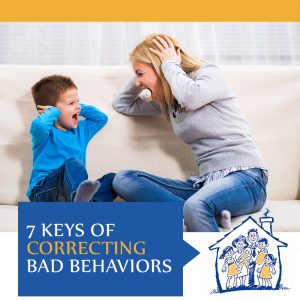Why Parents Must Explain Why
by Nicholeen Peck
When children are little they ask “Why?” about everything. They want to know: “Why is sky the blue?”, “Why can birds fly?” and “Why do we have to eat our vegetables?” While some questions are cute and fun to answer, others seem like a stall tactic or an annoyance. After a few years of answering the why questions to a child, it’s understandable if a parent might not want to answer all the why questions in the future and may choose to discontinue their lengthy explanations altogether. Yet, the non-stop why questions from children and the lengthy explanations by parents are a powerful part of teaching children, which facilitates heart change, and therefore should not be dodged by parents.
For a heart to fully change the brain must agree with the new direction the child’s will is being guided. Spirit and mind work together for a full change of heart. Wise parents remember that even if a child isn’t asking “Why?” about something, they naturally want to know the reason a decision has been made or an action is being requested. To respect the reasoning part of learning, it’s a great proactive parenting step to answer the child’s why question before it has been asked.
They Want to Know That Someone Knows
Quinton, my oldest, was so inquisitive. One day, at age 4, he asked me, “Why is the sky blue?” I went into a description about space, light, sunshine, reflection, and the atmosphere. He sat there looking like he was taking it all in. Then, after I was done explaining, he said, “Oh, okay” and said nothing more about it. I was surprised that after my explanation he didn’t have any other why questions. Later that day, after being so content with my earlier explanation, he couldn’t recall why the sky was really blue. Then, it occurred to me that he wasn’t asking why the sky was blue because he wanted to remember it, but to be sure that there was really a reason for it and that I knew it. Knowing that I knew why the sky was blue gave him a vision of the future knowledge that he would gain and helped him trust in my teaching and guidance. He knew that I knew stuff.
Now, before you feel like you have to know the science behind every childhood question, remember that it teaches a lot to a child when they see you search out an answer for something you don’t already know. It teaches them that they can trust you to guide them because you know how to learn. They must learn how to learn too, and they learn it from you.
Natural Ways to Teach Why
Parents are the primary and most influential teachers of their children. Children expect to be taught by their parents, even if they seem to resist that teaching sometimes. When children ask questions it’s natural to give answers. However, there are other ways to proactively instruct children ‘why’ they should do or not do certain things. For instance, when you see something around you that gets you thinking, express those thoughts aloud to your child. Tell them something unexpected. Let these thoughts lead naturally into memories from your life and the lessons that you’ve learned. As they hear how your brain thinks and how you learn, the children learn too.
Remember, parents are teachers. Every time you open your mouth or remain silent, in front of a child, you are teaching something morally, intellectually, spiritually, or emotionally. So, when you tell a child to do or not do something, tell them why. Give a reason that matters to them. Help them see the cause and effect of your thoughts and actions.
Another teaching moment comes when a child needs to be praised or corrected for an action. Give them a reason why the feedback is being given to them. Look into their eyes, with love and caring. Briefly tell them about the rationale for the teaching. If the rationale is something that matters to them, it will be more effective. If they see a reason to change for their own benefit they will learn the heart lesson better. The rationale step to effective corrections is the best place to really teach the heart the moral lessons that are needed. Bring in what is right and wrong, good and bad, and true and false. Warning: don’t lay it on too thick. Don’t lecture. If you abuse the attention, just to hear yourself talk, then they stop trusting the information because it ends up feeling like a control tactic.
Teaching Truth Really Does Change Hearts
When my oldest son entered adulthood, I could tell that he needed a little bit of guidance but didn’t know if he should ask anyone for advice or not. He could use a parent’s advice but thought that he needed to figure out everything since he was adult age.
One day, I went to his work at quitting time to meet him for a talk. He was surprised that I had come to meet him. While we sat in my car, I said, “Quin, you are an adult now and you’ve even had time living away from home, but I am still your mom. It’s important that we recognize our new roles. What is my role, as your mother now that you are an independent adult?”
After a few seconds of thought, Quin said, “Well, I guess your role is to advise me and make sure that I don’t do anything stupid.”
“Yes, that’s right,” I said. “I feel like you need some advice about something right now…” I went on to give him some loving, motherly advice that he needed in order to not make a big mistake with his life. He agreed with me and accepted my advice.
That afternoon, I shared an essential truth with my son; truth about who he was and who I was: our roles. Family roles are principles of truth that lead to freedom for relationships and communication, if properly honored. Additionally, I taught him how to accept feedback as an adult. I helped him see that I would always be a source, he could turn to in adulthood, of truth that would help him learn how to make wise life decisions. I told him why I needed to tell him something by explaining our roles and then explaining why I needed to give him the advice that I felt he needed. Explaining why to him opened his heart. It prepared him to listen to and feel the love behind the teaching. He allowed his heart to be soft and teachable because I took time to tell him why.
When parents take the time to lovingly instruct about truths, by addressing why things need to change or be done in a certain way, the child’s heart knows they are hearing the truth. This allows them to choose to have a change of heart. Even when your child doesn’t seem to agree, they can feel the truth when you tell them truth while addressing the why.
I’ll never forget when I asked my dad, as an 18-year-old young woman, if I could go on a trip with some friends. He said, “No.” I wasn’t happy about the decision, but he still told me why he felt it wouldn’t be smart. The moment he told me why, I knew that he was right, even though I still didn’t want to accept his “no” answer. I knew he was giving me a reason to stay out of danger with his loving “no” answer, even though I felt crushed to not be able to have the fun experience. My father didn’t think that I understood the truth of his counsel, but I did. The truth speaks loudly. It sounds in our hearts and minds. My heart agreed even if my passion didn’t want to agree. I will forever be grateful that my dad told me why so often, especially that one day when I really needed someone to help me avoid almost certain moral danger. Whether in their youth or as budding adults, our children need us to be brave enough to keep explaining truths by answering the question “Why?.”
Teach your family about roles by reading “Roles: The Secret To Family, Business, and Social Success”.
Index
- ADHD, Adult Children, Adults, Age, Analyzing, Assertive Communication, Behaviors, Boundaries, Calm, Changing Hearts, Character Building, Consequences, Encouragement, Expectations, Family Culture, Health, Motivating and Inspiration, Pre-Teach, Problem Solving, Relationships, Roles, Skills, Structure, Teens (Youth), Toddlers & Younger Children, Tone, Tweens, Vision






